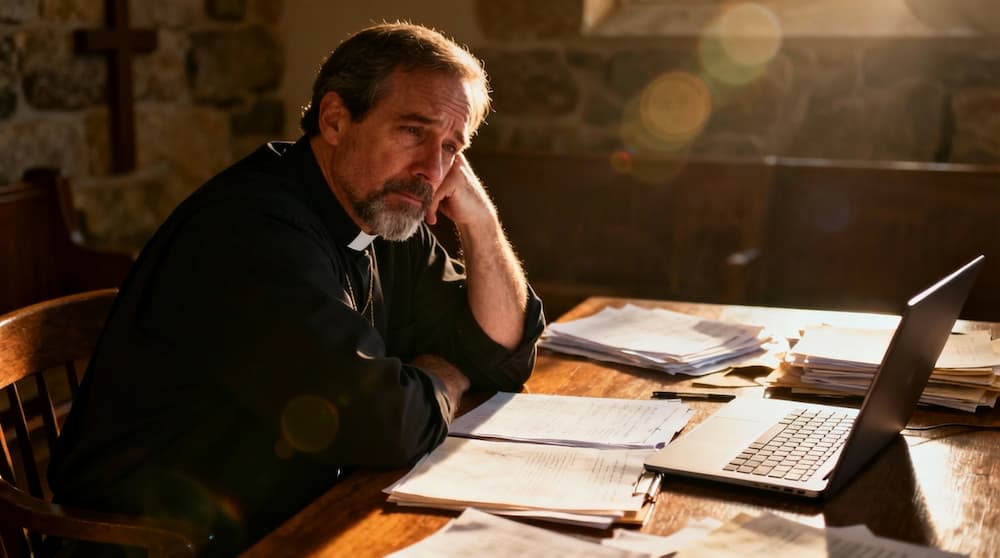Big Gifts Vs Recurring Giving: Which One Does Your Church Need?
How to overcome the summer giving slump with smart recurring donation strategies that keep generosity flowing—even when attendance dips.

What’s the role of big gifts in your financial strategy? And where does recurring giving factor in? Let’s explore both giving strategies – one-time generosity and recurring support – and how each one contributes to a healthy church budget.
A few weeks ago, at a church budgeting meeting, my team received wonderful news: someone had given a considerably large gift to the church that month. This made a real difference in helping us meet the budget, take a breath, and even dream a little bigger.
But then, as church leadership teams often do, we got practical.
“That was such a blessing,” someone said.
“But we can’t count on it next month,” someone else added.
And that’s when the conversation shifted.
“What we really need,” we all agreed, “is a stronger foundation of recurring giving.”
That’s true. It’s deeply helpful when members of your congregation commit to a recurring gift, whether that’s weekly, biweekly, or monthly, because it gives your team the ability to plan and steward funds with greater clarity.
But here’s another truth: God can strengthen your church budget through whatever means He chooses!
The Role of Big Gifts in Your Church Budget
There’s something powerful about a large financial gift given in faith. Whether it comes at the end of the year, during a building campaign, or just as a Spirit-led act of generosity, big gifts have the ability to move ministry forward quickly. They create margin, spark momentum, and often stir up faith in the entire church.
Why Big Gifts Matter:
They build faith.
Big gifts often come from individuals who are stretching themselves in generosity. That kind of bold obedience is contagious. It reminds the church that giving is spiritual and that God can use generosity to grow faith.
They create momentum.
A one-time gift can accelerate a campaign, fund a new ministry, or help a church recover from a tough financial stretch. These gifts often arrive just in time to meet a need or open a new door.
They model giving as worship.
When large gifts are offered as an act of worship, they serve as a visible expression of deep trust in God’s provision. This visible expression can inspire others to see their own giving through a spiritual lens.
They align with how some donors prefer to give.
Not everyone gives the same way. Some church members, especially those with income that fluctuates or is based on commission or year-end bonuses, prefer to give in larger amounts once or twice a year. This is still faithful giving, and it’s deeply appreciated.
They fuel year-end giving opportunities.
The end of the year is a natural moment for reflection and generosity. Big gifts during this season can provide a cushion heading into the new year or bring long-term goals within reach.
How to Budget Around Big Gifts
Big gifts are a blessing, but they’re also unpredictable. Sometimes, wise budgeting means treating those gifts as bonus provision, not necessarily baseline income.
Rather than building your annual budget around the hope of another big check, consider allocating large gifts toward one-time projects, debt reduction, or future reserves. This keeps your church financially stable while still honoring the generosity behind the gift.
Why Recurring Giving Builds Long-Term Financial Health for Churches
If big gifts feel like a breath of fresh air, recurring giving is the steady rhythm that keeps your church breathing in the first place. Recurring gifts are the foundation of a healthy church budget. They allow leaders to plan ahead, make long-term decisions, and fund ministry in every season – not just when giving spikes.
Why Recurring Giving Matters:
It invites everyone to participate.
Not everyone can give a large one-time gift, but most people can give something consistently. Whether it’s five dollars a month or five hundred, recurring giving allows people to invest in God’s mission through His church in a steady, sustainable way.
It reflects the discipline of giving.
Recurring giving turns generosity into a habit, not just a reaction. When vacations come, bills pile up, or people simply forget, those automatic gifts continue. It builds spiritual maturity and reflects a heart of faithfulness.
It creates stability.
Churches with strong recurring giving don’t have to wonder if they can make payroll or continue a key ministry. Especially during the summer slump, things can get tight. Recurring giving allows leaders to plan with confidence.
It helps with staffing.
An unpredictable economy makes it difficult to plan for staffing needs, and the last thing anyone wants is to hire new staff just to have to lay them off later on. Predictable income means churches can support and retain the people who keep ministry going. When giving is steady, staffing can be too.
It builds faith.
When someone commits to give consistently, regardless of what’s happening in their life, it is a beautiful display of trust and faithfulness. That kind of quiet, steadfast generosity is the heartbeat of a strong church and builds faith in others. Big acts of generosity build faith, but consistent ones do, too!
How to Encourage Recurring Giving at Your Church:
Talking about recurring giving from the pulpit can feel a little awkward, but it doesn’t have to be! Remind your congregation why it matters. It’s not just helpful for the church. It’s a spiritual practice that serves the giver, too.
When you talk about recurring giving, frame it around stewardship and discipleship. It’s not about automation for automation’s sake. It’s about building rhythms of generosity into our lives and making the things that matter most happen on purpose.
And don’t forget the most practical part: make it easy. Seriously! Accessibility is everything. Ensure your giving page is clear and mobile-friendly. Offer QR codes. Mention recurring giving from the stage.
Finally and most importantly, connect recurring giving to impact. Show people how their consistent generosity keeps ministry strong all year long.
So… Which One Do You Need?
Both. You need both!
Big gifts and recurring giving serve different purposes in a church budget, and both can be part of a healthy, faith-filled culture of generosity. Big gifts spark momentum. Recurring giving sustains it.
So thank God for the surprise blessing, and then build the kind of giving culture that can carry your church through every season with strength!
A Healthy Budget for a Healthy Church
Budgeting can be complicated, but recurring giving makes it a little more predictable. When giving is consistent, planning becomes easier. Staff can be supported. Ministries can be resourced. And instead of constantly wondering if there’s enough, church leaders can focus on what matters most: pastoring people and making disciples!
Need help strengthening your recurring giving strategy? Download our free Recurring Giving Guide to get practical tools, ideas, and next steps to help your church build a foundation of generosity that lasts.
Sign Up for Product Updates
What’s the role of big gifts in your financial strategy? And where does recurring giving factor in? Let’s explore both giving strategies – one-time generosity and recurring support – and how each one contributes to a healthy church budget.
A few weeks ago, at a church budgeting meeting, my team received wonderful news: someone had given a considerably large gift to the church that month. This made a real difference in helping us meet the budget, take a breath, and even dream a little bigger.
But then, as church leadership teams often do, we got practical.
“That was such a blessing,” someone said.
“But we can’t count on it next month,” someone else added.
And that’s when the conversation shifted.
“What we really need,” we all agreed, “is a stronger foundation of recurring giving.”
That’s true. It’s deeply helpful when members of your congregation commit to a recurring gift, whether that’s weekly, biweekly, or monthly, because it gives your team the ability to plan and steward funds with greater clarity.
But here’s another truth: God can strengthen your church budget through whatever means He chooses!
The Role of Big Gifts in Your Church Budget
There’s something powerful about a large financial gift given in faith. Whether it comes at the end of the year, during a building campaign, or just as a Spirit-led act of generosity, big gifts have the ability to move ministry forward quickly. They create margin, spark momentum, and often stir up faith in the entire church.
Why Big Gifts Matter:
They build faith.
Big gifts often come from individuals who are stretching themselves in generosity. That kind of bold obedience is contagious. It reminds the church that giving is spiritual and that God can use generosity to grow faith.
They create momentum.
A one-time gift can accelerate a campaign, fund a new ministry, or help a church recover from a tough financial stretch. These gifts often arrive just in time to meet a need or open a new door.
They model giving as worship.
When large gifts are offered as an act of worship, they serve as a visible expression of deep trust in God’s provision. This visible expression can inspire others to see their own giving through a spiritual lens.
They align with how some donors prefer to give.
Not everyone gives the same way. Some church members, especially those with income that fluctuates or is based on commission or year-end bonuses, prefer to give in larger amounts once or twice a year. This is still faithful giving, and it’s deeply appreciated.
They fuel year-end giving opportunities.
The end of the year is a natural moment for reflection and generosity. Big gifts during this season can provide a cushion heading into the new year or bring long-term goals within reach.
How to Budget Around Big Gifts
Big gifts are a blessing, but they’re also unpredictable. Sometimes, wise budgeting means treating those gifts as bonus provision, not necessarily baseline income.
Rather than building your annual budget around the hope of another big check, consider allocating large gifts toward one-time projects, debt reduction, or future reserves. This keeps your church financially stable while still honoring the generosity behind the gift.
Why Recurring Giving Builds Long-Term Financial Health for Churches
If big gifts feel like a breath of fresh air, recurring giving is the steady rhythm that keeps your church breathing in the first place. Recurring gifts are the foundation of a healthy church budget. They allow leaders to plan ahead, make long-term decisions, and fund ministry in every season – not just when giving spikes.
Why Recurring Giving Matters:
It invites everyone to participate.
Not everyone can give a large one-time gift, but most people can give something consistently. Whether it’s five dollars a month or five hundred, recurring giving allows people to invest in God’s mission through His church in a steady, sustainable way.
It reflects the discipline of giving.
Recurring giving turns generosity into a habit, not just a reaction. When vacations come, bills pile up, or people simply forget, those automatic gifts continue. It builds spiritual maturity and reflects a heart of faithfulness.
It creates stability.
Churches with strong recurring giving don’t have to wonder if they can make payroll or continue a key ministry. Especially during the summer slump, things can get tight. Recurring giving allows leaders to plan with confidence.
It helps with staffing.
An unpredictable economy makes it difficult to plan for staffing needs, and the last thing anyone wants is to hire new staff just to have to lay them off later on. Predictable income means churches can support and retain the people who keep ministry going. When giving is steady, staffing can be too.
It builds faith.
When someone commits to give consistently, regardless of what’s happening in their life, it is a beautiful display of trust and faithfulness. That kind of quiet, steadfast generosity is the heartbeat of a strong church and builds faith in others. Big acts of generosity build faith, but consistent ones do, too!
How to Encourage Recurring Giving at Your Church:
Talking about recurring giving from the pulpit can feel a little awkward, but it doesn’t have to be! Remind your congregation why it matters. It’s not just helpful for the church. It’s a spiritual practice that serves the giver, too.
When you talk about recurring giving, frame it around stewardship and discipleship. It’s not about automation for automation’s sake. It’s about building rhythms of generosity into our lives and making the things that matter most happen on purpose.
And don’t forget the most practical part: make it easy. Seriously! Accessibility is everything. Ensure your giving page is clear and mobile-friendly. Offer QR codes. Mention recurring giving from the stage.
Finally and most importantly, connect recurring giving to impact. Show people how their consistent generosity keeps ministry strong all year long.
So… Which One Do You Need?
Both. You need both!
Big gifts and recurring giving serve different purposes in a church budget, and both can be part of a healthy, faith-filled culture of generosity. Big gifts spark momentum. Recurring giving sustains it.
So thank God for the surprise blessing, and then build the kind of giving culture that can carry your church through every season with strength!
A Healthy Budget for a Healthy Church
Budgeting can be complicated, but recurring giving makes it a little more predictable. When giving is consistent, planning becomes easier. Staff can be supported. Ministries can be resourced. And instead of constantly wondering if there’s enough, church leaders can focus on what matters most: pastoring people and making disciples!
Need help strengthening your recurring giving strategy? Download our free Recurring Giving Guide to get practical tools, ideas, and next steps to help your church build a foundation of generosity that lasts.
podcast transcript
What’s the role of big gifts in your financial strategy? And where does recurring giving factor in? Let’s explore both giving strategies – one-time generosity and recurring support – and how each one contributes to a healthy church budget.
A few weeks ago, at a church budgeting meeting, my team received wonderful news: someone had given a considerably large gift to the church that month. This made a real difference in helping us meet the budget, take a breath, and even dream a little bigger.
But then, as church leadership teams often do, we got practical.
“That was such a blessing,” someone said.
“But we can’t count on it next month,” someone else added.
And that’s when the conversation shifted.
“What we really need,” we all agreed, “is a stronger foundation of recurring giving.”
That’s true. It’s deeply helpful when members of your congregation commit to a recurring gift, whether that’s weekly, biweekly, or monthly, because it gives your team the ability to plan and steward funds with greater clarity.
But here’s another truth: God can strengthen your church budget through whatever means He chooses!
The Role of Big Gifts in Your Church Budget
There’s something powerful about a large financial gift given in faith. Whether it comes at the end of the year, during a building campaign, or just as a Spirit-led act of generosity, big gifts have the ability to move ministry forward quickly. They create margin, spark momentum, and often stir up faith in the entire church.
Why Big Gifts Matter:
They build faith.
Big gifts often come from individuals who are stretching themselves in generosity. That kind of bold obedience is contagious. It reminds the church that giving is spiritual and that God can use generosity to grow faith.
They create momentum.
A one-time gift can accelerate a campaign, fund a new ministry, or help a church recover from a tough financial stretch. These gifts often arrive just in time to meet a need or open a new door.
They model giving as worship.
When large gifts are offered as an act of worship, they serve as a visible expression of deep trust in God’s provision. This visible expression can inspire others to see their own giving through a spiritual lens.
They align with how some donors prefer to give.
Not everyone gives the same way. Some church members, especially those with income that fluctuates or is based on commission or year-end bonuses, prefer to give in larger amounts once or twice a year. This is still faithful giving, and it’s deeply appreciated.
They fuel year-end giving opportunities.
The end of the year is a natural moment for reflection and generosity. Big gifts during this season can provide a cushion heading into the new year or bring long-term goals within reach.
How to Budget Around Big Gifts
Big gifts are a blessing, but they’re also unpredictable. Sometimes, wise budgeting means treating those gifts as bonus provision, not necessarily baseline income.
Rather than building your annual budget around the hope of another big check, consider allocating large gifts toward one-time projects, debt reduction, or future reserves. This keeps your church financially stable while still honoring the generosity behind the gift.
Why Recurring Giving Builds Long-Term Financial Health for Churches
If big gifts feel like a breath of fresh air, recurring giving is the steady rhythm that keeps your church breathing in the first place. Recurring gifts are the foundation of a healthy church budget. They allow leaders to plan ahead, make long-term decisions, and fund ministry in every season – not just when giving spikes.
Why Recurring Giving Matters:
It invites everyone to participate.
Not everyone can give a large one-time gift, but most people can give something consistently. Whether it’s five dollars a month or five hundred, recurring giving allows people to invest in God’s mission through His church in a steady, sustainable way.
It reflects the discipline of giving.
Recurring giving turns generosity into a habit, not just a reaction. When vacations come, bills pile up, or people simply forget, those automatic gifts continue. It builds spiritual maturity and reflects a heart of faithfulness.
It creates stability.
Churches with strong recurring giving don’t have to wonder if they can make payroll or continue a key ministry. Especially during the summer slump, things can get tight. Recurring giving allows leaders to plan with confidence.
It helps with staffing.
An unpredictable economy makes it difficult to plan for staffing needs, and the last thing anyone wants is to hire new staff just to have to lay them off later on. Predictable income means churches can support and retain the people who keep ministry going. When giving is steady, staffing can be too.
It builds faith.
When someone commits to give consistently, regardless of what’s happening in their life, it is a beautiful display of trust and faithfulness. That kind of quiet, steadfast generosity is the heartbeat of a strong church and builds faith in others. Big acts of generosity build faith, but consistent ones do, too!
How to Encourage Recurring Giving at Your Church:
Talking about recurring giving from the pulpit can feel a little awkward, but it doesn’t have to be! Remind your congregation why it matters. It’s not just helpful for the church. It’s a spiritual practice that serves the giver, too.
When you talk about recurring giving, frame it around stewardship and discipleship. It’s not about automation for automation’s sake. It’s about building rhythms of generosity into our lives and making the things that matter most happen on purpose.
And don’t forget the most practical part: make it easy. Seriously! Accessibility is everything. Ensure your giving page is clear and mobile-friendly. Offer QR codes. Mention recurring giving from the stage.
Finally and most importantly, connect recurring giving to impact. Show people how their consistent generosity keeps ministry strong all year long.
So… Which One Do You Need?
Both. You need both!
Big gifts and recurring giving serve different purposes in a church budget, and both can be part of a healthy, faith-filled culture of generosity. Big gifts spark momentum. Recurring giving sustains it.
So thank God for the surprise blessing, and then build the kind of giving culture that can carry your church through every season with strength!
A Healthy Budget for a Healthy Church
Budgeting can be complicated, but recurring giving makes it a little more predictable. When giving is consistent, planning becomes easier. Staff can be supported. Ministries can be resourced. And instead of constantly wondering if there’s enough, church leaders can focus on what matters most: pastoring people and making disciples!
Need help strengthening your recurring giving strategy? Download our free Recurring Giving Guide to get practical tools, ideas, and next steps to help your church build a foundation of generosity that lasts.
VIDEO transcript
What’s the role of big gifts in your financial strategy? And where does recurring giving factor in? Let’s explore both giving strategies – one-time generosity and recurring support – and how each one contributes to a healthy church budget.
A few weeks ago, at a church budgeting meeting, my team received wonderful news: someone had given a considerably large gift to the church that month. This made a real difference in helping us meet the budget, take a breath, and even dream a little bigger.
But then, as church leadership teams often do, we got practical.
“That was such a blessing,” someone said.
“But we can’t count on it next month,” someone else added.
And that’s when the conversation shifted.
“What we really need,” we all agreed, “is a stronger foundation of recurring giving.”
That’s true. It’s deeply helpful when members of your congregation commit to a recurring gift, whether that’s weekly, biweekly, or monthly, because it gives your team the ability to plan and steward funds with greater clarity.
But here’s another truth: God can strengthen your church budget through whatever means He chooses!
The Role of Big Gifts in Your Church Budget
There’s something powerful about a large financial gift given in faith. Whether it comes at the end of the year, during a building campaign, or just as a Spirit-led act of generosity, big gifts have the ability to move ministry forward quickly. They create margin, spark momentum, and often stir up faith in the entire church.
Why Big Gifts Matter:
They build faith.
Big gifts often come from individuals who are stretching themselves in generosity. That kind of bold obedience is contagious. It reminds the church that giving is spiritual and that God can use generosity to grow faith.
They create momentum.
A one-time gift can accelerate a campaign, fund a new ministry, or help a church recover from a tough financial stretch. These gifts often arrive just in time to meet a need or open a new door.
They model giving as worship.
When large gifts are offered as an act of worship, they serve as a visible expression of deep trust in God’s provision. This visible expression can inspire others to see their own giving through a spiritual lens.
They align with how some donors prefer to give.
Not everyone gives the same way. Some church members, especially those with income that fluctuates or is based on commission or year-end bonuses, prefer to give in larger amounts once or twice a year. This is still faithful giving, and it’s deeply appreciated.
They fuel year-end giving opportunities.
The end of the year is a natural moment for reflection and generosity. Big gifts during this season can provide a cushion heading into the new year or bring long-term goals within reach.
How to Budget Around Big Gifts
Big gifts are a blessing, but they’re also unpredictable. Sometimes, wise budgeting means treating those gifts as bonus provision, not necessarily baseline income.
Rather than building your annual budget around the hope of another big check, consider allocating large gifts toward one-time projects, debt reduction, or future reserves. This keeps your church financially stable while still honoring the generosity behind the gift.
Why Recurring Giving Builds Long-Term Financial Health for Churches
If big gifts feel like a breath of fresh air, recurring giving is the steady rhythm that keeps your church breathing in the first place. Recurring gifts are the foundation of a healthy church budget. They allow leaders to plan ahead, make long-term decisions, and fund ministry in every season – not just when giving spikes.
Why Recurring Giving Matters:
It invites everyone to participate.
Not everyone can give a large one-time gift, but most people can give something consistently. Whether it’s five dollars a month or five hundred, recurring giving allows people to invest in God’s mission through His church in a steady, sustainable way.
It reflects the discipline of giving.
Recurring giving turns generosity into a habit, not just a reaction. When vacations come, bills pile up, or people simply forget, those automatic gifts continue. It builds spiritual maturity and reflects a heart of faithfulness.
It creates stability.
Churches with strong recurring giving don’t have to wonder if they can make payroll or continue a key ministry. Especially during the summer slump, things can get tight. Recurring giving allows leaders to plan with confidence.
It helps with staffing.
An unpredictable economy makes it difficult to plan for staffing needs, and the last thing anyone wants is to hire new staff just to have to lay them off later on. Predictable income means churches can support and retain the people who keep ministry going. When giving is steady, staffing can be too.
It builds faith.
When someone commits to give consistently, regardless of what’s happening in their life, it is a beautiful display of trust and faithfulness. That kind of quiet, steadfast generosity is the heartbeat of a strong church and builds faith in others. Big acts of generosity build faith, but consistent ones do, too!
How to Encourage Recurring Giving at Your Church:
Talking about recurring giving from the pulpit can feel a little awkward, but it doesn’t have to be! Remind your congregation why it matters. It’s not just helpful for the church. It’s a spiritual practice that serves the giver, too.
When you talk about recurring giving, frame it around stewardship and discipleship. It’s not about automation for automation’s sake. It’s about building rhythms of generosity into our lives and making the things that matter most happen on purpose.
And don’t forget the most practical part: make it easy. Seriously! Accessibility is everything. Ensure your giving page is clear and mobile-friendly. Offer QR codes. Mention recurring giving from the stage.
Finally and most importantly, connect recurring giving to impact. Show people how their consistent generosity keeps ministry strong all year long.
So… Which One Do You Need?
Both. You need both!
Big gifts and recurring giving serve different purposes in a church budget, and both can be part of a healthy, faith-filled culture of generosity. Big gifts spark momentum. Recurring giving sustains it.
So thank God for the surprise blessing, and then build the kind of giving culture that can carry your church through every season with strength!
A Healthy Budget for a Healthy Church
Budgeting can be complicated, but recurring giving makes it a little more predictable. When giving is consistent, planning becomes easier. Staff can be supported. Ministries can be resourced. And instead of constantly wondering if there’s enough, church leaders can focus on what matters most: pastoring people and making disciples!
Need help strengthening your recurring giving strategy? Download our free Recurring Giving Guide to get practical tools, ideas, and next steps to help your church build a foundation of generosity that lasts.





















.jpeg)





